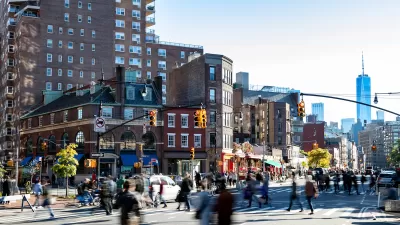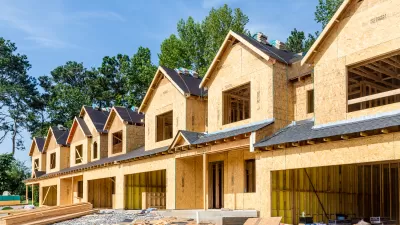As planners, we are accustomed to (and expect) some types of urban development proposals to attract controversy. Whether the opposition is to new roads, higher-density housing or undesirable land uses such as industries or prisons, such controversies are becoming far more common as environmental, economic and social issues become more pronounced and widely understood. In most cases, we generally assume that we can make use of a suite of engagement strategies to engage stakeholders and try to resolve typical development conflicts.
As planners, we are accustomed to (and
expect) some types of urban development proposals to attract controversy.
Whether the opposition is to new roads, higher-density housing or undesirable
land uses such as industries or prisons, such controversies are becoming far
more common as environmental, economic and social issues become more pronounced
and widely understood. In most cases, we generally assume that we can make use of a suite of engagement strategies to engage stakeholders
and try to resolve typical development conflicts.
However, the nationwide debate over the
proposed Islamic community center at 45 Park Place Manhattan is unprecedented,
and well beyond any local development controversy with which any of us have
likely dealt. It will surely stand as one of the most significant land use
debates in modern planning history – and not at all because of the substantive
planning issues involved or the actual merit of the proposal. Rather it will be
a landmark debate in terms of how it has been cynically politicized, and how
the effects of this manipulation will ripple across the country. While it clearly shows the
extent to which 9/11 is a still-open wound, at the same time, it has also
exposed a dangerous undercurrent of vitriol, paranoia and racism which threatens to contaminate American
society and political discourse for years to come.
Like so many politicized issues, this
debate is characterized by virulent and highly misleading rhetoric. The
proposed project, the Park51 Islamic Cultural Center is not a mosque, and it is not "at" Ground Zero. It will feature multiple uses, and it is several blocks away,
with no view of the WTC site. According to the project website, Park51 is
"dedicated to pluralism, service, arts and culture, education and
empowerment, appreciation for our city and a deep respect for our
planet...Park51 will grow into a world-class community center, planned to include the following facilities:
- outstanding recreation spaces and fitness facilities (swimming pool, gym, basketball court)
- a 500-seat auditorium
- a restaurant and culinary school
- cultural amenities including exhibitions
- education programs
- a library, reading room and art studios
- childcare services
- a mosque, intended to be run separately from Park51 but open to and
accessible to all members, visitors and our New York community - a September 11th memorial and quiet contemplation space, open to all."
On its merits, this would seem an excellent project for the area, and an exciting reuse of a building that has otherwise sat vacant for 9 years since it was damaged on September 11th 2001. What has transformed this debate beyond the
scope of any previous municipal planning issue is not only the raw emotions
still felt from the 9/11 attacks, but the extent to which these are being used
by the Center's opponents to stoke fear and hatred of a minority group. Stephen
Salisbury, author of the recent book Mohamed's Ghosts writes on TomDispatch that:
"The mosque controversy is not really about
a mosque at all; it's about the presence of Muslims in America, and the
free-floating anxiety and fear that now dominate the nation's psyche. The mere
presence of Muslims at prayer is now enough to trigger angry protests Those
opposing the construction of the center in New York City are drawing on what
amounts to a decade of government-stoked xenophobia about Muslims, now
gathering strength and visibility in a nation full of deep economic anxieties
and increasingly aggressive far-right grassroots groups."
Salisbury points out that the anti-mosque
movement has spread beyond Manhattan to Tennessee, California, Georgia,
Kentucky, Wisconsin, and Illinois as well as Brooklyn and Staten Island, where
mosque proposals and permit applications are being met with angry protests. The
extent of this opposition is so extreme that there are calls for an outright
ban on such construction: Bryan Fischer of the influential conservative
organization the American Family Association stated that "permits should
not be granted to build even one more mosque in the United States of America."
This is clearly getting out of hand, and
dangerously so. Places of worship being violently opposed and vilified could
easily lead to acts of terrorism. Indeed, we have already seen such this past May in the
failed pipe bombing of a mosque in Jacksonville Florida. If present anti-Muslim rhetoric continues to escalate, the consequences could be deadly.
The United States of America was built on multiple freedoms, among them the freedom
of religion. Communities of faith need places of worship, so campaigns aimed at denying
the right of an established faith to provide for their community through building should be seen
as intolerable and condemned.
We must guard
against religious bigotry in land use decisions. It may be too late for planners to have
much influence over the fate of the Park51 proposal, but we could well see the
poisonous legacy of this debate infect our own towns and cities. It is incumbent on planners to
defend the rights of American Muslims to plan and build for their growing
communities, so that they may be free to practice their faith in places of worship like
any other Americans -- as the Founding Fathers intended.

Pennsylvania Mall Conversion Bill Passes House
If passed, the bill would promote the adaptive reuse of defunct commercial buildings.

Planning for Accessibility: Proximity is More Important than Mobility
Accessibility-based planning minimizes the distance that people must travel to reach desired services and activities. Measured this way, increased density can provide more total benefits than increased speeds.

Fair Housing Cannot Take a Back Seat to ‘Build, Baby, Build’
If we overlook fair housing principles in the plan to build US housing back better, we risk ending up right back where we started.

LA Metro Board Approves New 710 Freeway Plan
The newest plan for the 710 corridor claims it will not displace any residents.

Austin’s Proposed EV Charging Rules Regulate Station Locations, Size
City planners say the new rules would ensure an efficient distribution of charging infrastructure across the city and prevent an overconcentration in residential areas.

Making California State Parks More Climate-Resilient
A recently released report offers recommendations for keeping state parks healthy and robust, including acquiring additional land for conservation and recreation.
City of Costa Mesa
Licking County
Barrett Planning Group LLC
HUD's Office of Policy Development and Research
Mpact Transit + Community
HUD's Office of Policy Development and Research
Tufts University, Department of Urban and Environmental Policy & Planning
City of Universal City TX
ULI Northwest Arkansas
Write for Planetizen
Urban Design for Planners 1: Software Tools
This six-course series explores essential urban design concepts using open source software and equips planners with the tools they need to participate fully in the urban design process.
Planning for Universal Design
Learn the tools for implementing Universal Design in planning regulations.
























